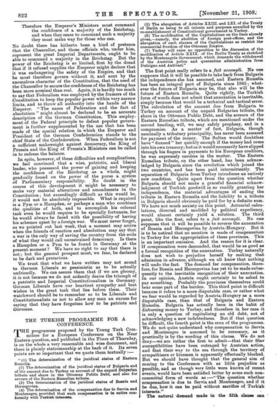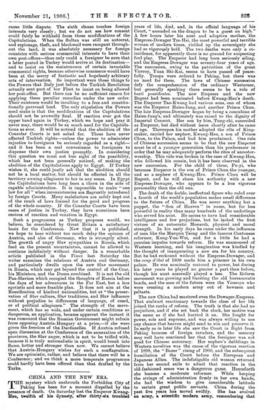THE TURKISH PROGRAMME FOR A CONFERENCE.
THEprogramme proposed by the Young Turk Com- mittee for a European Conference on the Near Eastern question, and published in the Times of Thursday, is on the whole a very reasonable and wise document, and there is plainly statesmanship at the back of it. Its seven points are so important that we quote them textually :— "(1) The determination of the juridical status of Eastern Rumelia.
(2) The determination of the juridical status of Bulgaria and of the amount due to Turkey on account of the unpaid Bulgarian tribute and share in the Ottoman Public Debt, and also for arrears of the Eastern Rumelian tribute.
(3) The determination of the juridical status of Bosnia and Herzegovina.
(4) The determination of the compensation due to Servia and Montenegro, provided that such compensation is in entire con- formity with Turkish interests. (5) The abrogation of Articles XXIII. and LXI. of the Treaty of Berlin as being to all intents and purposes annulled by the re-establishment of Constitutional government in Turkey. (6) The modification of the Capitulations on the lines already given,—namely, the abolition of foreign post-offices, and the abrogation of such clauses of the Capitulations as restrict the commercial freedom of the Ottoman Empire.
(7) Turkey will raise no opposition to the discussion of the modification of Article XXIX. of the Berlin Treaty as sketched by the Montenegrin Government, which demands the withdrawal of the Austrian police and quarantine administration from Dulcigno and Antivari."
The first point really refers to a fait accompli. No one supposes that it will be possible to take back from Bulgaria the independence she has assumed, and Eastern Rumelia has been an integral part of Bulgaria since 1885; what-. ever the future of Bulgaria may be, that also will be the future of Eastern Rumelia. Quite rightly, the Turkish form of words does not admit that annexation is inevitable, simply because that would be a technical and tactical error.
The calculation of the amount due from Bulgaria to Turkey on account of the unpaid Bulgarian tribute, the share in the Ottoman Public Debt, and the arrears of the Eastern Rumelian tribute, which are mentioned under the second heading, will, we may safely prophesy, end in a, compromise. As a matter of fact, Bulgaria, though nominally a tributary principality, has never been assessed for payment of the money. The Sultan would doubtless have " dunned " her quickly enough if the money had come into his own treasury; but as it would necessarily have slipped through his fingers in payments to his European creditors, he was supremely careless in the matter. The Eastern Rumelian tribute, on the other hand, has been acknow- ledged by Bulgaria since the revolution which joined the two countries, and has been paid intermittently. The separation of Bulgaria from Turkey introduces an entirely new condition. Quite apart from the question whether Bulgaria should not make a graceful financial acknow- ledgment of Turkish goodwill in so readily granting her independence, the material advantages of ending the tribute in Eastern Rumelia and the liability to a tribute in Bulgaria should obviously be paid for by a definite sum. We have not much anxiety on this point. Actuarial calcu- lations, directed and modified by political expediency, would almost certainly yield a solution. The third point, like the first, refers to a fait accompli. No one supposes that it will be possible to reverse the annexation of Bosnia and Herzegovina by Austria-Hungary. But it is to be noticed that no mention is made of compensation to Turkey for the appropriation of these provinces. This is an important omission. And the reason for it is clear. If compensation were demanded, that would be as good as a formal recognition of the annexation. Turkey naturally does not wish to prejudice herself by making that admission in advance, although we all know that nothing will undo the fact. The demand for compensation, there- fore, for Bosnia and Herzegovina has yet to be made subse- quently to the inevitable recognition of their annexation. In our opinion, Austria ought certainly to be asked to pay something. Probably the provinces themselves could bear some part of the burden. This third point is difficult because it refers to a more disputable case, or rather what we fear would be regarded by Austria-Hungary as a more disputable case, than that of Bulgaria and Eastern Rumelia. Bulgaria has actually been in the habit of disbursing money to Turkey, and therefore in her case it is only a question of capitalising an old debt, not of acknowledging a new indebtedness. But if that question be difficult, the fourth point is the crux of the programme. We do not quite understand why compensation to Servia. and Montenegro is assumed to be necessary, as it practically is by the wording of• this clause. We do not deny—we are rather the first to admit—that their Slav susceptibilities have been outraged by Austrian action, and that their way to the sea through the territory of sympathisers or kinsmen is apparently effectually blocked. But we should have thought that the general aim of coming to the Conference with as little prejudice as possible, and as though very little were known of recent events, would have been satisfied better by some such non- committal form of words as :—" The question whether compensation is due to Servia and Montenegro, and if it be due, how it can be paid without sacrifice of Turkish interests."
The natural .demand made in the fifth clause can cause little dispute. The sixth clause touches foreign interests very closely; but we do not see how consent could fairly be withheld from these modifications of the Capitulations. When the Sultan was still an autocrat, and espionage, theft, and blackmail were rampant through- out the land, it was absolutely necessary for foreign cotmtries with serious commercial interests to have their own post-offices—thus only could a foreigner be sure that a letter posted in Turkey would arrive at its destination— and to insist on the maintenance of certain invariable commercial rights, because otherwise commerce would have been at the mercy of fantastic and hopelessly arbitrary acts of intervention. So important were those things to the Powers that Italy just before the Turkish Revolution actually sent part of her Fleet to insist on being allowed her post-office. But there can be no sufficient reason for applying these peculiar remedies under the new order. Their existence would be insulting to a free and constitu- tionally governed land. The only stipulation the Powers need make is that the modifications of the Capitulations should not be avowedly final. If reaction ever got the upper hand again in Turkey, which we hope and pray it never may, there would be as much need for the Capitula- tions as ever. It will be noticed that the abolition of the Consular Courts is not asked for. These have never affected Turkish rights—unless the power to administer injustice to foreigners be seriously regarded as a right— and it has been a, real convenience to foreigners to dispense their own justice promptly. In considering this question we must not lose sight of the possibility, which has not been generally noticed, of making the abolition of the Capitulations apply to Egypt. If Turkey wishes it, she could justly ask that the abolition should not be a local matter, but should be effected in all the territory owning allegiance to her in any sense. In Egypt the Capitulations have long been a thorn in the side of capable administration. It is impossible to make "one law for all" when inconsistencies are flagrantly introduced by foreign Courts. Many malefactors are safely kept out of the reach of laws framed for the good and progress of the whole country. If the Consular Courts have been oases of justice in Turkey, they have sometimes been centres of reaction and vexation in Egypt. Such a programme as Turkey proposes would, we believe, be considered by Great Britain a satisfactory basis for the Conference. Now that it is published, we hope to hear without too much delay the opinion of Austria, and also of Germany, who is strangely silent. The growth of angry Slav sympathies in Russia, which feed on the present uncertainties, cannot be allowed to continue indefinitely without danger. In a remarkable article published in the Times last Saturday the writer examines the relations of Austria and Germany, and particularly dwells upon the new Slav movement in Russia, which may get beyond the control of the Czar, his Ministers, and the Duras, combined. It is not the old Pan-Slavism which occupied the thoughts of Russia before the days of her adventures in the Far East, but a less egotistic and more feasible plan. It does not aim at the Russification of kindred nationalities, but at "the preser- vation of Slav culture, Slav traditions, and Slav influence without prejudice to differences of language, of creed, or of political allegiance." The strength of the move- ment, which has so wide, and under certain conditions so dangerous, an application, became apparent the instant it was rumoured that the Russian Government might refrain from opposing Austria-Hungary at a price,—if she were given the freedom of the Dardanelles. If Austria refused open discussion at the Conference of the annexation of the provinces, the Slav anger, which is not to be trifled with, because it is truly nationalistic in spirit, would break into flame, hotter and stronger than now. We cannot believe that Austria-Hungary wishes for such a conflagration. We are optimistic, rather, and believe that there will be a Conference; and we think a more temperate programme could hardly have been offered than that drafted by the Turks,

































































 Previous page
Previous page